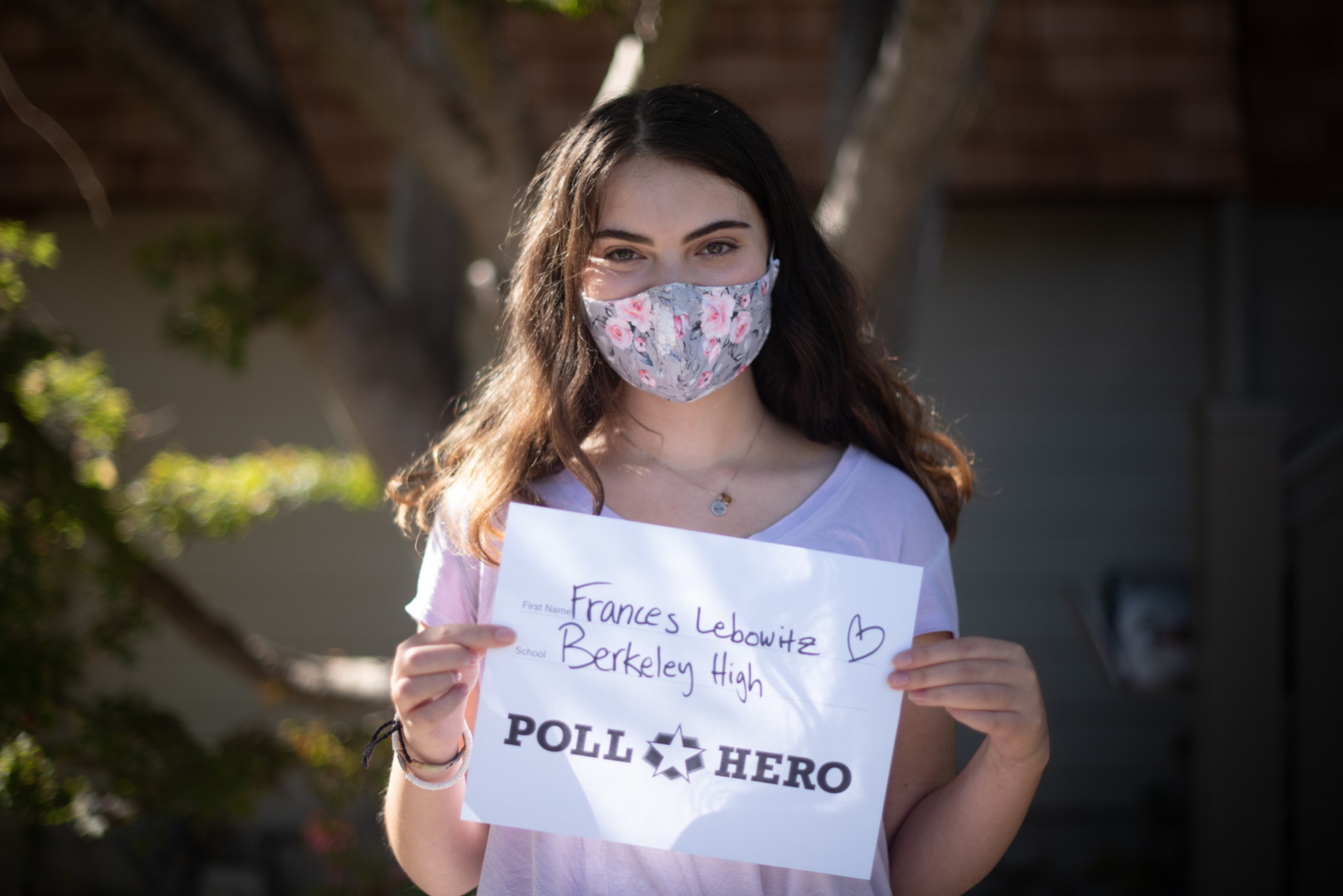The importance of voting has been a major topic of discussion as the 2020 election draws nearer. Being ineligible to vote does not mean that students cannot participate in the election. Whether through working at polls, phone banking, creating voting guides, or encouraging friends and family to vote, there are a myriad of ways for students to get involved.
As a result of the conditions created by the pandemic, high school students have been filling the spots of older poll workers in order to open as many polling locations as possible. Frances Lebowitz, a Berkeley High School (BHS) junior in the Academy of Medicine and Public Service (AMPS), has been working on the operations team of the organization Poll Hero to recruit high school poll workers. One of the main strategies she and her team have been using to recruit new poll workers is social media.
Lebowitz’s social media organizing has proven to be effective, as it is how Emi Rohn, a Berkeley International High School (BIHS) senior, found out about being a poll worker through Poll Hero. “For me, being a poll worker allows me to learn more about our political system, and maybe I will gain some expertise from this experience that I can pass on to other young people and encourage them to vote in that way,” she said.
A push in students signing up to be poll workers through sites like Poll Hero has actually led to a surplus of poll workers in certain counties and cities. At first glance, the surplus seems to be a positive, but upon closer inspection, the situation is more complex. "Too many poll workers [are] not in the right places,” said Lebowitz, who explained that smaller cities and counties are seeing a surplus of poll workers while large cities are still experiencing shortages. However, Lebowitz said that surpluses in places such as Alameda County do not mean that these counties cannot use more poll workers. “What we’ve heard from working directly with states and counties is that they can never really have too many poll workers because you’re always going to have a certain number that can’t make it to the polls or end up cancelling — especially right now during Covid,” she added.
Lebowitz attended a two hour in-person training to help prepare for working at the polls. At the training, Lebowitz was told that all volunteers will be provided with face shields and plexiglass dividers, in addition to wearing masks and practicing social distancing. During her training, Lebowitz also learned how to assemble voting kits, how to use printers for the ballots, and how to operate the online voting system, among other skills for helping people cast ballots.
Many students are also taking the initiative to phone bank for the Biden-Harris campaign in swing states, as well as for congressional elections to help flip the Senate. The BHS club NorCal Students 4 Biden (NCS4B) has been holding weekly phone banking sessions for these two goals. “Our organization is really focused on getting Biden elected, but Biden can’t succeed to his fullest potential as a president if he doesn’t have the Senate,” said BIHS senior and co-founder of NCS4B, Noah DeLay.
NCS4B has also produced content on Instagram to educate students on Biden’s proposals and strengths. “We try to make content that articulates ‘Why Biden?’ because I think we all know ‘Why not Trump?’ ” explained Daniel Esler, a BIHS senior and other co-founder of NCS4B. In Esler’s view, students can act as “foot soldiers'' in this election and play a critical role in preventing four more years of Trump’s presidency.
Anna Dua, a senior in BIHS and president of Youth and Government (Y&G), is focusing on the importance of being educated on local and state propositions and candidates regardless of whether or not you can vote. “Learn about measures and props to influence people around you. Talk to your parents, guardians, and your friends who are voting,” she said. In order to educate herself and her peers on down-ballot issues, Dua has been working to create voting guides for Y&G and Vote16.
Dua has also been working as an intern with Easy Bay Activist Alliance to help elect down-ballot democratic candidates in various swing states. Specifically, she has been working to turn out voters for Coral Evans, a democrat running for Arizona House of Representatives against a Republican incumbent.
Something that Lebowitz, Rohn, DeLay, Esler, and Dua all have in common is their emphasis on student involvement in this election. “It’s really clear to see the consequences of this election, but it’s really hard to describe its urgency. So if there’s one thing that I could tell my peers, it would be to feel that urgency,” said Esler.





